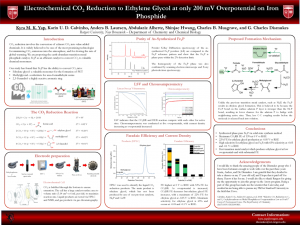Yap, Kyra: Electrochemical CO2 Reduction to Ethylene Glycol at only 200 mV Overpotential on Iron Phosphide
Title: Electrochemical CO2 Reduction to Ethylene Glycol at only 200 mV Overpotential on Iron Phosphide
Name: Kyra Yap
Major: Chemical Engineering
School affiliation: School of Engineering
Programs: Dept of Chemistry
Other contributors: Karin U. D. Calvinho, Anders B. Laursen, Abdulaziz Alhertz, Shinjae Hwang, Charles B. Musgrave, G. Charles Dismukes
Abstract: The electro-catalyzed carbon dioxide reduction reaction (CO2RR) is a renewable process which has the potential to replace petroleum feedstocks as the cornerstone for future chemical and fuel production. Among the organic chemicals that can be derived from carbon dioxide, monomers such as ethylene glycol are of special interest because of their high market demand and their potential to utilize CO2 as the main source to manufacture renewable plastics. We present iron phosphide as a new, earth-abundant catalyst for the electrochemical conversion of CO2 to ethylene glycol, as well as to the additional products of formate, methylglyoxal (C3), and 2,3-furandiol (C4). Iron phosphide catalyzes the 10-electron reduction reaction to ethylene glycol at potentials as low as 0 V vs RHE, with a maximal Faradaic Efficiency for ethylene glycol production of 22% at -0.05 V vs RHE.
